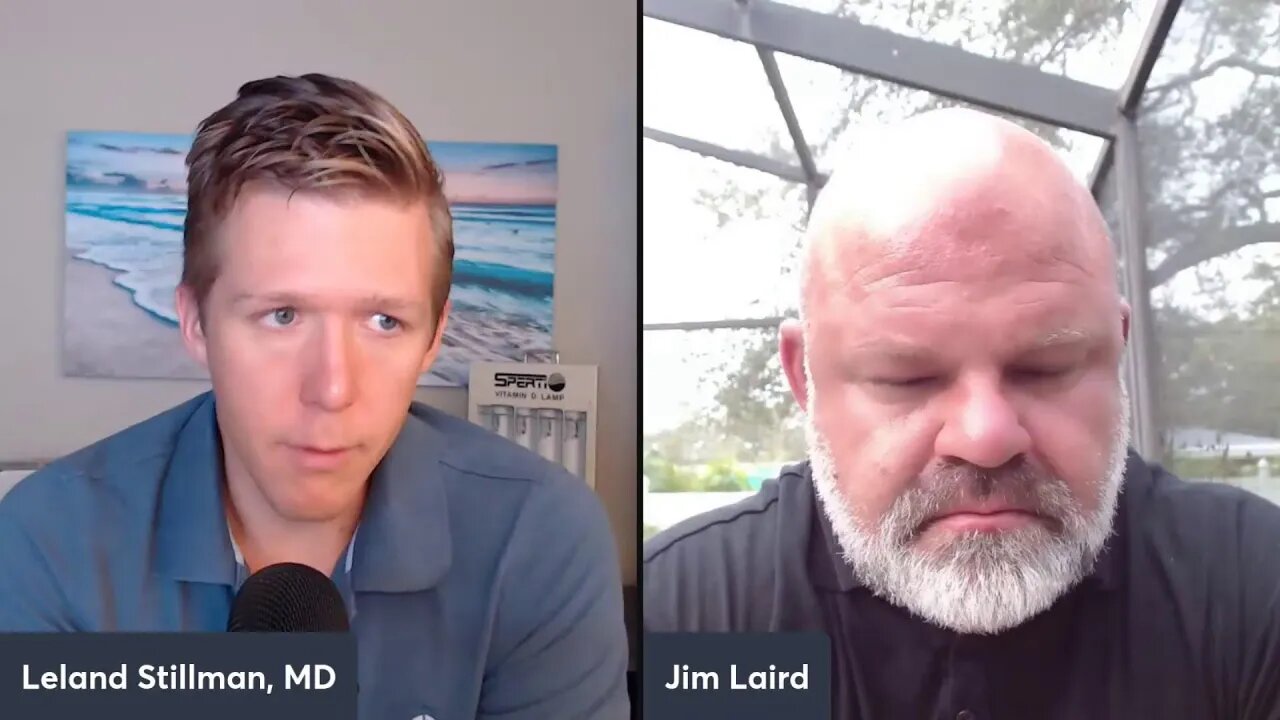Premium Only Content

Blood Pressure HRV Blood Pressure Meds and Stress
Blood Pressure HRV Blood Pressure Meds and Stress
Join FOW USE JIM for 10% off:
https://www.stillmanwellness.com/
https://stillmanmd.com/
Our Retreat in Nicaragua:
https://info.granpacifica.com/rest-reset-recharge-vip-vacation-package
Buy The Thyroid Course with coaching Early Bird use code JIM for 10% https://www.stillmanwellness.com/offers/cxADx8ni
To Learn More about the course set reminder for webinar:
https://www.youtube.com/watch?v=1OqXb2e5NBQ
[00:06] Bad internet in Florida, better internet in Nicaragua
: Improving Internet Connection
- If you're experiencing internet issues in Florida, it can be frustrating. However, the video stresses that internet in Nicaragua is better. To improve your internet connection in Florida, consider switching to a different internet service provider or exploring technological solutions like Wi-Fi extenders or signal boosters.
[04:06] Stopping blood pressure medication led to significant improvements in HRV and resting heart rate.
: Stopping Blood Pressure Medication and Improvements.
- The video highlights a case where stopping blood pressure medication resulted in significant improvements. Within three days of stopping the medication, the person's heart rate variability (HRV) increased from 5 to over 70, and their resting heart rate decreased from 70-80 to 50. However, it's crucial to consult with a healthcare professional before making any changes to your medication regimen.
[08:22] Taking time for rest and relaxation is crucial for success.
: Achieving Rest and Relaxation.
- The video acknowledges that many high achievers struggle with slowing down and relaxing. It emphasizes that slowing down and relaxation require time and effort. To achieve rest and relaxation, it suggests seeking accountability and guidance from a coach or therapist who can help develop strategies and hold you accountable. Practices like mindfulness, meditation, and boundary-setting can also contribute to achieving relaxation goals.
[12:20] Engaging in outdoor activities and getting sunlight is essential for overall health and longevity.
: Benefits of Outdoor Activities and Sunlight.
- The video underscores the vital role of outdoor activities and sunlight in promoting long-lasting health. Beyond its vitamin D content, sunlight offers red and infrared light, visible light, and other essential advantages. Although vitamin D supplements can contribute, they cannot fully replicate the benefits of natural sunlight. Consequently, actively spending time outdoors and participating in physical pursuits can significantly enhance mental well-being and overall health.
[16:26] Spending time outside for Tai Chi has a psychological effect of actually doing it.
: Motivation for Physical Activities.
- In this section, the video mentions that booking a paid service increases motivation to practice physical activities like Tai Chi. It acknowledges that the virtual world and traffic can make it harder for people to engage in physical activities, but it emphasizes the importance of finding motivation and making time for them.
[19:50] Optimal resting heart rate is highly individual, but generally, it should be in the 60s or lower.
: Understanding Resting Heart Rate.
- The video stresses an individual's resting heart rate should ideally be around 60 beats per minute or lower. It cites factors like age, fitness, gender, chemicals, electrolyte balance, environment, and medications affecting heart rate. The video recommends activities like walking, light cardio, and breathing exercises, along with addressing root causes. Consulting a healthcare professional is essential for personalized guidance on resting heart rate concerns.
[23:26] Fluoride in the water supply is a big health mistake.
: Concerns about Fluoride in Water Supply.
- The video states adding fluoride to water is seen as a major public health error and suggests discontinuing fluoridated medications for improved results. It notes low hair potassium levels possibly indicating chronic stress and excessive fluoride intake potentially linking to high blood pressure. This perspective from the video underscores the need for further research and healthcare consultation for a comprehensive grasp of the topic.
[26:55] Reducing sodium intake may not help people with high blood pressure
: Lifestyle Changes for High Blood Pressure.
- The video suggests that simply reducing sodium intake might not be the sole remedy for addressing high blood pressure. It proposes exploring additional lifestyle adjustments such as sun exposure, nasal breathing, restorative yoga, and personalized guidance. Recognizing high blood pressure as a multifaceted issue, the video underscores the need for tailored treatment and care. Collaborating with a healthcare expert is advised to create a holistic strategy for managing blood pressure, considering one's unique situation.
-
 LIVE
LIVE
Eternal_Spartan
12 hours agoThe Legend of Zelda: Majoras Mask Ep. 5 | USMC Vet | Come Join the Best Chat on Rumble!!!!
94 watching -
 3:44:24
3:44:24
Barry Cunningham
7 hours agoBREAKING NEWS: LIVE COVERAGE OF NEW YORK POLICE OFFICERS UNDER SIEGE!
88.9K66 -
 2:51:25
2:51:25
The Pascal Show
4 hours ago $1.71 earnedBREAKING! Active Shooter In Midtown Manhattan NYC Multiple People Shot!
19.3K2 -
 10:25
10:25
MattMorseTV
9 hours ago $11.42 earnedVance just DROPPED a NUKE.
38.8K41 -
 5:05:09
5:05:09
Jokeuhl Gaming and Chat
7 hours agoDARKTIDE - Warhammer 40k w/ Nubes and AoA
17.2K2 -
 2:53:08
2:53:08
Shoriantrax
3 hours agoLIVE: Hardcore Chaos in Tarkov – Loot, Die, Repeat!
10.3K -
 LIVE
LIVE
John_Goetz
4 hours agoJohn Gets Gaming - Medal of Honor Vanguard Part 2
10 watching -
 1:29:09
1:29:09
RiftTV
6 hours agoSydney Sweeney Spreading RACIST Propaganda? | The Rift | Guest: Braeden Sorbo + Sarah Stock
38.9K10 -
 4:08:44
4:08:44
VapinGamers
4 hours ago $0.02 earnedDestiny 2 - The Premium Destiny 2 Experience with the Community! - !rumbot !music
3.6K -
 2:36:01
2:36:01
We Like Shooting
17 hours ago $0.31 earnedWe Like Shooting 621 (Gun Podcast)
3.03K